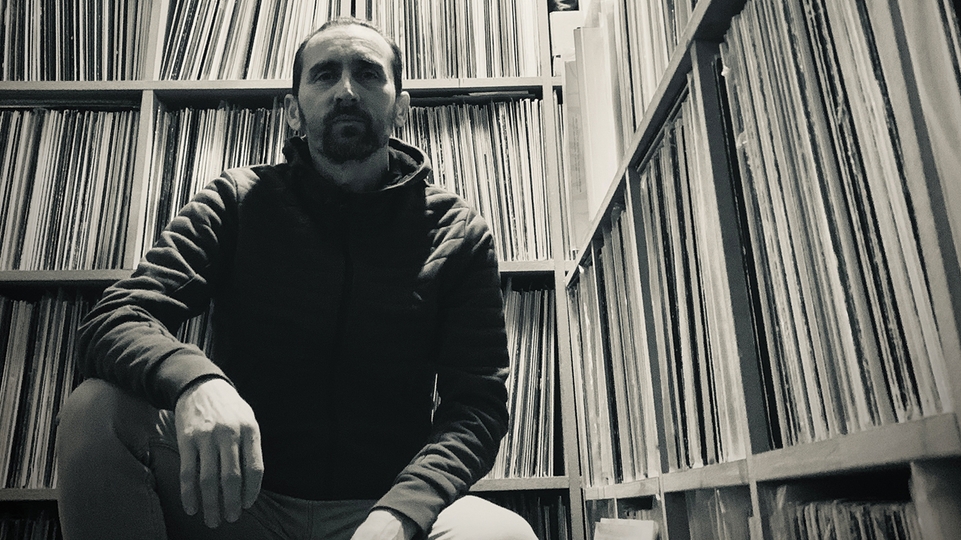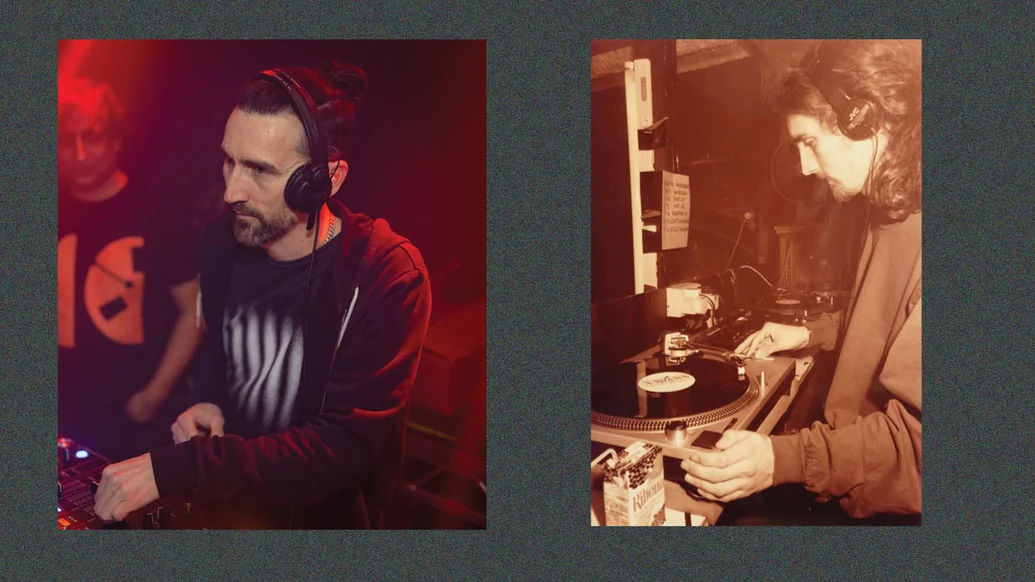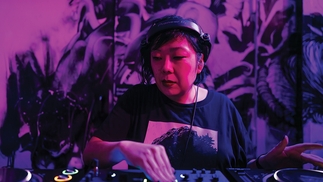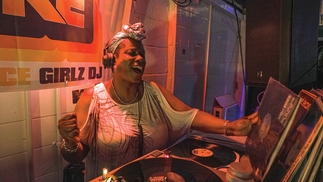On Cue: Warlock

South London-based Warlock has been DJing since 1989, and has watched the UK scene evolve through countless phases. He’s taken that history with him, but as Ben Hindle discovers, he is driven by a dedication to the new. His On Cue mix goes from 130 - 210 BPM, and demonstrates his genre-mashing sound
Warlock. The word conjures images of hooded figures casting dark magic. In dance music circles, it refers to a man who wields similarly arcane power, transforming dancefloors into whirling masses with his alchemical sets and productions. As of 2022, Warlock — aka Jason Alexander — has spent 33 years as a DJ and almost as many making his own tracks. During that time he’s worn many guises, shapeshifting as trends came and went, evolving as the sound did.
From his earliest days in the hardcore scene, through the savage techno of mid-’90s London, the chaotic genre-mashing brilliance of his and noyeahno’s Rag & Bone label, the juke and footwork explosion of the 2010s, right up to the present day, when he’s come full circle to produce breakbeat artillery as Hooverian Blur, his hunger for the new has kept him both at the bleeding edge and firmly in his own lane. A sneak peak at a cache of dubs and forthcoming music for Discs Of The World and Lobster Theremin reveals that’s only set to continue, with jungle-injected club tracks from Hooverian Blur and tough but hypnotic 150BPM techno on the way as Warlock.
“I’m just always trying to find the new music, the new sound. That’s what drives me, really, certainly from a DJing point of view,” says Alexander from his South London home. “What I’m playing now... I’ll probably be playing something different in a couple of years. What I was playing two years ago was different and 10 years ago was different.”
He sometimes wonders if never settling has “complicated” his career — some of his ’90s peers have done very well out of sticking with a certain sound — but it’s simply not him. “For me, chasing that new music at the new frontier, that’s when it’s most exciting, ’cause people don’t know what they’re making.” For Alexander, the death knell comes “once something becomes a thing and it gets a name and there’s a formula”.
Then, as more and more identikit tracks are churned out, the cutting edge becomes blunt, and he gradually loses interest. “I just find myself saying no to more and more stuff,” he explains. “Then I’ll be like, ‘What’s this one over here, I can’t even put a label on this!’ — that’s what keeps me going.” He references DJ Narrows’ iconic 2001 UKG cut ‘Saved Souls’, putting his own spin on the classic vocal: “If it wasn’t for new music, I dunno what I’d do,” he says with a smile. “I love all the old music, but I couldn’t be doing it all the time.”
He does do it sometimes, though. His productions feature familiar reference points, drawing connections across his past like string between pins in a map. Yet they’re set against crisp, modern production — always pushing forwards, never wallowing in nostalgia. “I don’t like going too much over already existing territory,” he says. “You can’t deny your influences, they’re all in there... you can’t make music in a complete vacuum.”
His breakthrough Hooverian Blur track, 2020’s ‘Old Gold’, utilises elements first made famous by Origin Unknown’s jungle classic ‘Valley Of The Shadows’, including the instantly recognisable tinkling Korg Mono/Poly arpeggio. Alexander discovered it on an old Future Music sample pack that was doing the rounds online, cut it up and reshaped it into a cosmic breaks-driven hit for Sneaker Social Club. The project’s recent four-tracker for Yellow Machines, meanwhile, opens with ‘Confusions’, which hops between a galloping pad and a bassline that seems to ping off every surface. It feels like an old friend, and Alexander reveals his main influence was the rubbery synths of Jack Smooth and Wax Doctor’s jungle techno work for Basement Records.
The key is to harness those influences to create new moments, not repeat those that have already happened. “I think this is why I’ve always dotted around so many different genres,” he continues. “I’ve always really liked the fact that there’ll be an existing style and then someone will come along and do something different and it’s like, ‘Woah! That’s the next step!’ There used to be the thing of, ‘Right, I need to go one step further and beat that track’, and I’ve seen a lot of music evolve over the decades in that very way. And I feel like that still goes on, but we’re in a slightly different space at the moment where it’s like, learn how to make some music, be able to produce it very well, but it’s just about emulating an existing form.”

As for his own aims, though he’s hesitant to use the word “bangers”, Alexander concedes that essentially, as someone who still considers himself a DJ more than a producer, that’s what he’s striving for — “something that hits the spot on the dancefloor”. His process is “probably more accident than design”, drawing on his knowledge and experience, but then letting the creativity flow. “Sometimes it’s just whatever appears in front of me, like you’re just a conduit for ideas from elsewhere — that are coming from within, but they’re beyond that. It’s just a combination of all these random factors: how you’re feeling, what buttons you’re pressing, what machines you’re working with, what samples you’ve managed to assemble. When I make music, I very much look at it as an artist with a blank canvas and a set of paints or various types of media to make different colours or patterns with.”
As we chat, floor-to-ceiling stacks of records loom over Alexander, extending out of our Zoom call’s field of view (and continuing upstairs in his bedroom, we’re told). He talks about digging deep for promoters like South London hardcore/jungle specialists Distant Planet, or for one-off shows on his usually future-facing Threads radio show (such editions include early grime instrumentals and golden-age dubstep). He enjoys the process; the slow building of a record bag over the course of a night, methodically testing out each plate, checking B-sides, rediscovering old gems. He still buys records, too.
“I think Norman Jay said this: ‘The best way to buy old music is to buy it when it’s new’, and I definitely work by that,” says Alexander. “He was referring to the days of the rare groove scene, they were playing the old soul and Motown stuff and people were paying expensive prices for these old records. You can see it happening now, people pay absurd prices for old anything these days, it’s all going up.” (Alexander’s own early releases as Lorenz Attractor, alongside Jason Mendonça, now go for upwards of £30 on Discogs, and wiill soon be reissued by Forbidden Planet Records.)
It’s not that he’s against people spending £100 on an old jungle record if they want to, “but I do think: be into this stuff now, this stuff is happening now. I don’t wanna be discovering it 10, 20 years on.”
Alexander’s epiphany came at Knowledge, the now-legendary midweek techno night launched in ‘92 at SW1 Club in Victoria, London. He would attend religiously, taking in the tough, futuristic sounds of residents Colin Dale and Colin Faver, guests like Richie Hawtin and Lenny Dee, and DJs from other scenes, such as Grooverider and Jumpin Jack Frost, who the night’s promoter Jane Howard — who also ran Serious Business, the DJ agency Alexander was on at the time — would bring in to play special techno sets. “I remember it was a really important moment for me. I was standing up on the balcony looking down on the dancefloor going, ‘You’ve just gotta breathe in the now, it won’t be here forever’.”
In the case of SW1 Club, he was more right than he could have known — “It’s a shopping mall now,” he notes, going on to trace the development and destruction of scenes and spaces around the capital — Soho, Shoreditch, the list goes on. At the moment, South London — the area he calls home — is having a moment, and Alexander is in the thick of it. He sings the praises of Deptford record shop Planet Wax, a regular hang out just a short bike
ride from his digs. “I can go down there and see people I know from all around the country or maybe they get guests in from abroad, I don’t have to pay an entrance fee or blag myself on the guestlist, or have a whole night out and get drunk. I can just soak up some brilliant music, catch up with some people, see all the wonderful people who run the shop...” Nearby club Venue MOT is another hotspot, while Peckham continues to be a hub (though many feel it’s on the turn).
“There’s quite a lot down this way. It’s still quite real. The overt gentrification and property developers haven’t quite squeezed the life out of the place yet, but it is inevitable,” he says. “These kinds of cultural centres slowly move... it’s never fixed forever.”
Far from gloomy about the situation, Alexander has hope for the future — he’s seen it all before. “It’ll pop up somewhere else, it’s this kind of spirit that lives on in different people, different places. One little motto that I kind of humorously made up a little while ago was ‘No point being in the past ‘cause you’ll be there when you die’,” he laughs, “it’ll probably be on my tombstone! But the music will always carry on. It’s always interesting to think, how will people be processing what’s happening now, 200 years on?
“It will be a sort of old historical thing, like people looking back at Shakespeare or music hall — this distant thing in the past that you really have to research to find out about. In theory there’s loads more stuff being left now — pictures, videos, millions of podcasts and streams online — but that might all suddenly disappear at the flick of a switch. It’s all digital; there might be a different digital in a few years and then the current digital becomes an obsolete format and all that history is lost,” Alexander muses. Pausing, he once again becomes aware of his surroundings, adding with a laugh: “Apart from piles of records!”
Tracklist:
Alienationist 'Don't Worry, You Can Always Re-Born As A Screenshot'
Fingers Of God 'Modal Resonator'
Tammo Hesselink 'Water Plus'
Imaginary Number II 'Somebody'
Bluetoof 'Kaput'
Eich 'Induction'
Farsight 'Flash Flood'
Mystic Letter K 'Soul Storm'
Controlled Weirdness 'In The Shadows'
Underground Resistance 'Fibre Optic Commando'
Imaginary Number II 'Grv'
Delay Grounds 'Marcelo's Whistle'
Samba x Chokez 'Ghostly (Calm Stiege Funky Edit)'
Cocktail Party Effect 'Racka'
Untold 'No One Likes A Smart-Arse'
Satin Storm 'EBGB'
Meat Beat Manifesto 'Bo Bots'
An Avrin 'Parisian Pitstop'
Hooverian Blur 'Delusion'
Jason Code 'City 17'
DJ ADHD & Nikki Nair 'Rips'
Warlock 'Granular'
Warlock 'Clysm'
Warlock 'Flash Crash'
Kodah 'Ghost Machine'
Nebuchadnezzar 'Link my pager'
Warlock 'Rush Rush'
Warlock 'Stinger'
Asquith 'Forget The Past'
INVT 'Pop, Motion'
Flore 'Coded Language (3Phaz Remix)'
FFF 'Ambush'
Hooverian Blur 'Red Scare'
Hooverian Blur 'Cut and Dried'
Bulu 'Warrior'
Swarmm 'Coils'
Objekt 'Bad Apples'
Ploy '5G Bats'
Toma Kami 'Later to the Bone'
Speedy J 'In-Formation'






